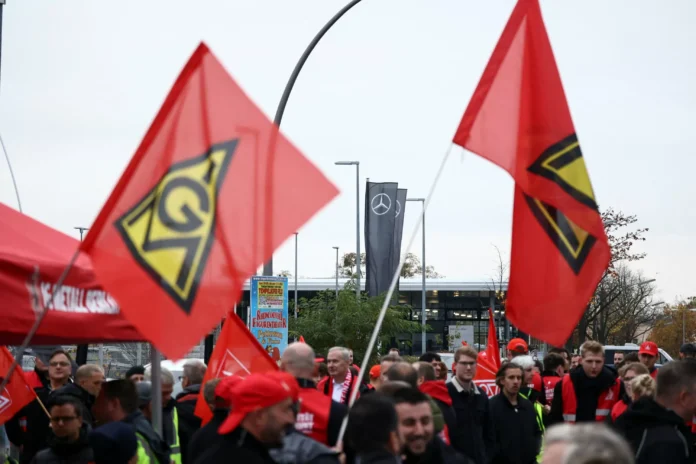Thousands of German workers have taken to the streets on Tuesday to demand higher wages, causing widespread strikes across the country. This move has added to the concerns of companies already struggling to stay globally competitive due to rising costs, particularly in the wake of the COVID-19 pandemic.
The strikes, organized by the powerful IG Metall union, have affected a wide range of industries, including the automotive, engineering, and metalworking sectors. The workers are demanding a 4% wage increase, shorter working hours, and the option to reduce their working hours to 28 hours per week for up to two years.
The decision to strike comes after months of unsuccessful negotiations between the union and employers’ representatives. The union argues that workers deserve a fair share of the profits generated by these companies, especially as they have been working tirelessly throughout the pandemic to keep the economy afloat.
The strikes have caused disruptions in production and supply chains, leading to concerns about the impact on the German economy, which is heavily reliant on its manufacturing sector. However, the workers remain determined to fight for their rights and are willing to bear the short-term consequences for the long-term benefits.
The timing of these strikes is crucial, as Germany is facing increasing pressure to remain competitive in the global market. The country’s high labor costs have been a cause for concern for many companies, who fear losing their competitive edge to countries with lower labor costs. However, the workers argue that their wages have not kept up with the rising cost of living, and it is time for them to be fairly compensated for their hard work.
The strikes have also highlighted the growing income inequality in Germany, with the country’s top earners seeing significant increases in their salaries while the average worker’s wages have remained stagnant. This has led to a sense of frustration and anger among the workers, who feel that their contributions are not being adequately recognized.
The IG Metall union has a long history of fighting for workers’ rights, and their determination to secure a fair deal for their members is commendable. The strikes have received widespread support from the public, with many expressing solidarity with the workers’ cause. This is a testament to the strong sense of community and social responsibility that exists in Germany.
The strikes have also sparked a national debate about the future of work and the need for a better work-life balance. The demand for shorter working hours and the option to reduce working hours is a reflection of the changing attitudes towards work and the recognition that employees need time for their personal lives and well-being.
The German government has also weighed in on the issue, with Labor Minister Hubertus Heil urging both sides to find a compromise and avoid prolonged strikes. He emphasized the need for a fair and balanced solution that takes into account the interests of both workers and employers.
In the midst of all the uncertainty and challenges, there is a glimmer of hope. The strikes have opened up a dialogue between workers and employers, and there is a possibility for a mutually beneficial agreement to be reached. This could lead to a more harmonious and productive working relationship in the future.
Moreover, the strikes have brought attention to the need for companies to invest in their workers and ensure their well-being. This is not only crucial for maintaining a competitive edge but also for creating a more equitable and sustainable society.
In conclusion, the nationwide strikes by German workers may have caused disruptions and concerns, but they have also shed light on important issues that need to be addressed. The workers’ determination to fight for their rights and the support they have received from the public is a testament to the strong values of fairness and social responsibility that are deeply ingrained in German society. Let us hope that a positive and mutually beneficial solution can be reached, paving the way for a brighter future for both workers and companies.


